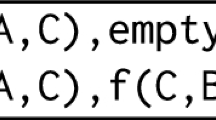Abstract
First-order theory refinement using neural networks is still an open problem. Towards a solution to this problem, we use inductive logic programming techniques to introduce FOCA, a First-Order extension of the Cascade ARTMAP system. To present such a first-order extension of Cascade ARTMAP, we: a) modify the network structure to handle first-order objects; b) define first-order versions of the main functions that guide all Cascade ARTMAP dynamics, the choice and match functions; c) define a first-order version of the propositional learning algorithm to approximate Plotkin’s least general generalization. Preliminary results indicate that our initial goal of learning logic programs using neural networks can be achieved.
Preview
Unable to display preview. Download preview PDF.
Similar content being viewed by others
References
Basilio R., Zaverucha, G., and Garcez, A.: Inducing Relational Concepts with Neural Networks Via the LINUS System, In Proc. Fifth International Conference on Neural Information Processing (ICONIP’98), Vol. 3, Japan, 1998, pp. 1507–1510.
Botta M., Giordana A., and Piola, R.: FONN: Combining First Order Logic with Connectionist Learning. Proc. of the 14th International Conference on Machine Learning ICML-97, Morgan Kaufmann, 1997, pp. 46–56.
Bratko, I.: Refining Complete Hypotheses in ILP. ILP-99, LNAI 1634, Springer-Verlag, 1999, pp. 44–55
Carpenter, G. A., Grossberg, S., Reynolds, J.H., Markuzon, N., Rosen, D.B.: Fuzzy ARTMAP: A neural network architecture for incremental supervised learning of analog multidimensional maps. IEEE Trans. Neural Networks 3, 1992, pp. 698–713.
Domingos, P.: Rule Induction and Instance-Based Learning: a Unified Approach, IJCAI, vol. 2, 1995, pp. 1226–1232.
Garcez, A. S., Zaverucha G.: The Connectionist Inductive Learning and Logic Programming System. Applied Intelligence Journal, F. Kurfess (editor), Vol. 11, Number 1, 1999, pp. 59–77.
Hallack, N. A., Zaverucha, G., and Barbosa, V. C.: Towards a hybrid model of first-order theory refinement. In Hybrid Neural Systems. LNAI 1778, Springer-Verlag, 2000.
Haussler, D.: Learning Conjunctive concepts in structural domains. Machine Learning 4, 1989, pp. 7–40.
Idestam-Almquist, P.: Efficient Induction of Recursive Definitions by Structural Analysis of Saturations. Advances in Inductive Logic Programming. Ed. Luc De Raedt, IOS Press, 1996, pp. 192–205.
Lavrac, N., and Dzeroski, S.: Inductive Logic Programming: Techniques and Applications. Ellis Horwood Series in Artificial Intelligence, 1994.
Mahoney, J.J., and Mooney, R. J.: Combining Connectionist and Symbolic Learning Methods to Refine Certainty-factor Rule-bases. Connection Science 5, 1993, pp. 339–364.
Michie, D., Muggleton, S., Page, D., Srinivasan, A.: To the international computing community: a new East-West Challenge. Technical Report, Oxford University Computing Laboratory, Oxford, UK, 1994.
Muggleton, S., and Feng, C.: Efficient Induction of Logic Programs. In Muggleton, S. (Eds) Inductive Logic Programming, Academic Press, London, 1992, pp. 453–472.
Muggleton, S.: Inverse Entailment and Progol. In New Generation Computing 13, 1995, pp. 245–286.
Muggleton, S.: Inductive logic programming: issues, results and the LLL challenge. Artificial Intelligence 114, pp. 283–296, December 1999, pp. 283–296.
Plotkin, G.: A further note on inductive generalization. Machine Intelligence, v. 6. University Press, 1971.
Quinlan, J. R.: Learning logical definitions from relations. Machine Learning 5, 1990, pp. 239–266.
Ramon, J. and Bruynooghe, M.: A framework for defining distances between first-order logic objects. ILP-98, LNAI 1446. Springer-Verlag, 1998, pp. 271–280.
Sebag, M. and Rouveirol, C.: Tractable Induction and Classification in First-Order Logic Via Stochastic Matching. Proc. of the 15th International Join Conference on Artificial Intelligence IJCAI-97, Morgan Kaufmann, 1997, pp. 888–892.
Shavlik, J.: Framework for Combining Symbolic and Neural Learning. Machine Learning 14, 1994, pp. 321–331.
Tan, Ah-Hwee: Cascade ARTMAP: Integrating Neural Computation and Symbolic Knowledge Processing. IEEE Trans.on Neural Networks vol. 8, n. 2, 1997, pp. 237–250.
Towell, G., and Shavlik, J.: Knowledge-Based Artificial Neural Networks. Artificial Intelligence, vol. 70, 1994, pp. 119–165.
Wrobel, S.: First Order Theory Refinement. Advances in Inductive Logic Programming. Ed. Luc De Raedt, IOS Press, 1996, pp. 14–33.
Kijsirikul, B. and Sinthupinyo, S.: Approximate ILP Rules by Backpropagation Neural Network: A Result on Thai Character Recognition. 9th International Workshop on Inductive Logic Programming, LNAI 1634, Springer-Verlag, 1999, pp. 162–173.
Author information
Authors and Affiliations
Editor information
Editors and Affiliations
Rights and permissions
Copyright information
© 2001 Springer-Verlag Berlin Heidelberg
About this paper
Cite this paper
Basilio, R., Zaverucha, G., Barbosa, V.C. (2001). Learning Logic Programs with Neural Networks. In: Rouveirol, C., Sebag, M. (eds) Inductive Logic Programming. ILP 2001. Lecture Notes in Computer Science(), vol 2157. Springer, Berlin, Heidelberg. https://doi.org/10.1007/3-540-44797-0_2
Download citation
DOI: https://doi.org/10.1007/3-540-44797-0_2
Published:
Publisher Name: Springer, Berlin, Heidelberg
Print ISBN: 978-3-540-42538-0
Online ISBN: 978-3-540-44797-9
eBook Packages: Springer Book Archive




